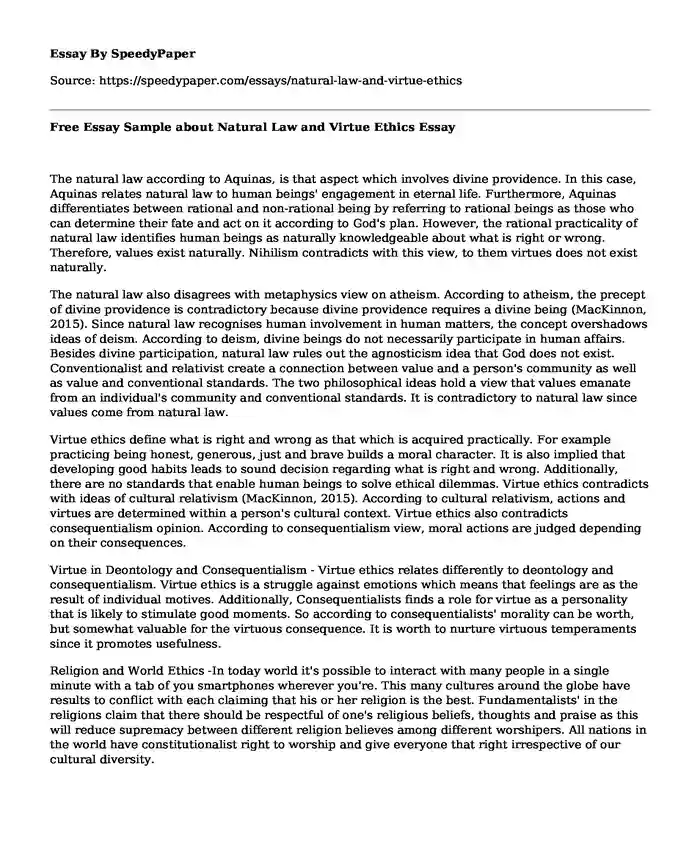
| Type of paper: | Literature review |
| Categories: | Philosophy Religion Ethics |
| Pages: | 2 |
| Wordcount: | 491 words |
The natural law according to Aquinas, is that aspect which involves divine providence. In this case, Aquinas relates natural law to human beings' engagement in eternal life. Furthermore, Aquinas differentiates between rational and non-rational being by referring to rational beings as those who can determine their fate and act on it according to God's plan. However, the rational practicality of natural law identifies human beings as naturally knowledgeable about what is right or wrong. Therefore, values exist naturally. Nihilism contradicts with this view, to them virtues does not exist naturally.
The natural law also disagrees with metaphysics view on atheism. According to atheism, the precept of divine providence is contradictory because divine providence requires a divine being (MacKinnon, 2015). Since natural law recognises human involvement in human matters, the concept overshadows ideas of deism. According to deism, divine beings do not necessarily participate in human affairs. Besides divine participation, natural law rules out the agnosticism idea that God does not exist. Conventionalist and relativist create a connection between value and a person's community as well as value and conventional standards. The two philosophical ideas hold a view that values emanate from an individual's community and conventional standards. It is contradictory to natural law since values come from natural law.
Virtue ethics define what is right and wrong as that which is acquired practically. For example practicing being honest, generous, just and brave builds a moral character. It is also implied that developing good habits leads to sound decision regarding what is right and wrong. Additionally, there are no standards that enable human beings to solve ethical dilemmas. Virtue ethics contradicts with ideas of cultural relativism (MacKinnon, 2015). According to cultural relativism, actions and virtues are determined within a person's cultural context. Virtue ethics also contradicts consequentialism opinion. According to consequentialism view, moral actions are judged depending on their consequences.
Virtue in Deontology and Consequentialism - Virtue ethics relates differently to deontology and consequentialism. Virtue ethics is a struggle against emotions which means that feelings are as the result of individual motives. Additionally, Consequentialists finds a role for virtue as a personality that is likely to stimulate good moments. So according to consequentialists' morality can be worth, but somewhat valuable for the virtuous consequence. It is worth to nurture virtuous temperaments since it promotes usefulness.
Religion and World Ethics -In today world it's possible to interact with many people in a single minute with a tab of you smartphones wherever you're. This many cultures around the globe have results to conflict with each claiming that his or her religion is the best. Fundamentalists' in the religions claim that there should be respectful of one's religious beliefs, thoughts and praise as this will reduce supremacy between different religion believes among different worshipers. All nations in the world have constitutionalist right to worship and give everyone that right irrespective of our cultural diversity.
References
MacKinnon, B. (2015). Ethics: Theory and contemporary issues. Belmont, Calif: Cengage Learning
Cite this page
Free Essay Sample about Natural Law and Virtue Ethics. (2022, Apr 19). Retrieved from https://speedypaper.net/essays/natural-law-and-virtue-ethics
Request Removal
If you are the original author of this essay and no longer wish to have it published on the SpeedyPaper website, please click below to request its removal:
- God or No God - Free Essay in Religion
- Essay Example for Free: New Economy Research
- Robin Hood and Management, Business Essay Sample
- Self-Handicapping Essay Example
- Raymond Rocca: The Trust Breaker. Free Essay for Everyone
- Free Essay on the Effects of a Trade War Between the United States and China
- Free Essay Example: Increasing Diversity in the Workplace
Popular categories




